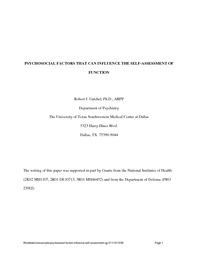
ATTENTION: The works hosted here are being migrated to a new repository that will consolidate resources, improve discoverability, and better show UTA's research impact on the global community. We will update authors as the migration progresses. Please see MavMatrix for more information.
Show simple item record
| dc.contributor.author | Gatchel, Robert J. | en |
| dc.date.accessioned | 2009-10-15T17:12:48Z | en |
| dc.date.available | 2009-10-15T17:12:48Z | en |
| dc.date.issued | 2004-09 | en |
| dc.identifier.citation | Published in Journal of Occupational Rehabilitation, v. 14, no. 3 | en_US |
| dc.identifier.uri | http://hdl.handle.net/10106/1917 | en |
| dc.description | Author's final draft after peer review, also known as a post print. | en_US |
| dc.description.abstract | What has plagued the evaluation process in this area has been the level of agreement in the wide variation in the measures used to document a construct such as pain, as well as changes in that construct as reflected in the measurement of function. The present article reviews the major psychosocial barriers to assessment/recovery that have been implicated as influencing the self-assessment of function. The following are discussed: secondary gain; secondary loss; emotional distress (such as anger, anxiety and depression); psychopathology; somatization and symptom magnification; compliance and resistance; patient comprehension/mental status; and iatrogenic effects. | en_US |
| dc.description.sponsorship | The writing of this paper was supported in part by Grants from the National Institutes of Health (2K02 MH1107, 2R01 DE10713, 3R01 MH46452) and from the Department of Defense (PRO 23002) | en_US |
| dc.language.iso | en_US | en_US |
| dc.publisher | Springer Netherlands | en_US |
| dc.subject | biopsychosocial | en_US |
| dc.subject | disability | en_US |
| dc.subject | function | en_US |
| dc.subject | pain | en_US |
| dc.title | Psychosocial Factors That Can Influence the Self-Assessment of Function | en_US |
| dc.type | Article | en_US |
| dc.publisher.department | Department of Psychology, The University of Texas at Arlington. | en_US |
| dc.identifier.externalLinkDescription | The original publication is available at article DOI. | en |
| dc.identifier.doi | http://dx.doi.org/10.1023/B:JOOR.0000022761.95103.f8 | |
Files in this item
- Name:
- psychosocial factors-influence-self ...
- Size:
- 121.0Kb
- Format:
- PDF
- Description:
- PDF file
- Name:
- psychosocial factors-influence-self ...
- Size:
- 33.53Kb
- Format:
- Text file
- Description:
- Text
This item appears in the following Collection(s)
Show simple item record


